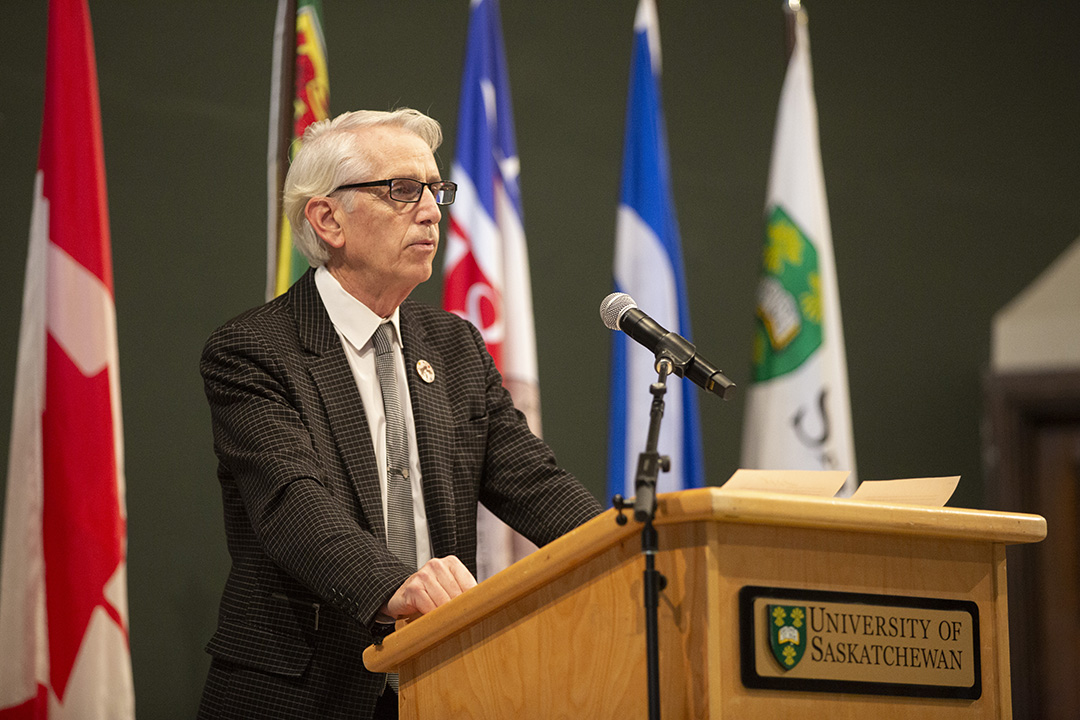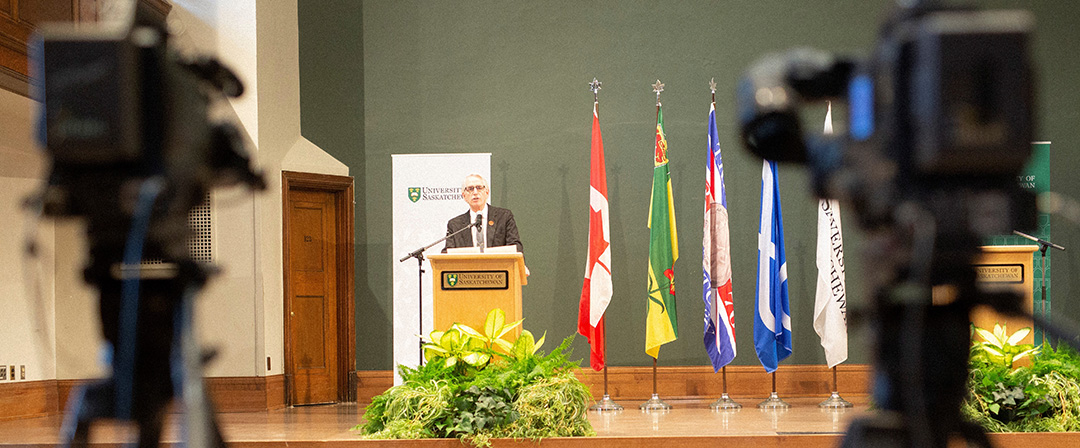
The president’s perspective: New year brings new optimism for USask
The year 2020 will be remembered as the year of the pandemic, but for President Peter Stoicheff it was also the year the University of Saskatchewan (USask) passed one of the most critical tests in its storied 113-year history.
By James Shewaga“The pandemic is the greatest challenge the university has faced in decades,” said Stoicheff, now in his sixth year serving as USask president. “It would be up there with the Great Depression and the (Spanish Flu) pandemic of 1918, and I think the campus has responded in extraordinary fashion. I am constantly reminded of the enormous resilience and responsiveness that this university has shown, almost to the year, across a span of a hundred years.”
As the campus community begins the new year with new hope—and with COVID-19 vaccines on the way—Stoicheff said it will not be business as usual post-pandemic, with the university busy preparing to build on the lessons learned in a year we will never forget.
“With our post-pandemic shift project, we need to ask ourselves, ‘What are the major ways in which we need to change to continue to be the university a new post-pandemic world needs?’ We will not just be going back to normal. It will be a new normal,” said Stoicheff.
“There are fundamental changes in programming, in research, in the way we are structured, and in the way we work with each other, that will change. We are a major research-intensive university in this country and a significant player in the university environment and we need to ask ourselves how we can best respond to these changes to help make the world a better place in the future. We are in the midst of exploring that, and that is exciting.”
As the president looks back on the challenges of 2020, he is quick to commend the patience and perseverance of students, staff and faculty who successfully made the monumental move in mid-March to remote delivery of all classes and exams to complete the semester, a practice that has continued in the 2020/21 academic year.
“Faculty, staff and students had to adjust mid-stream at a very challenging time and everybody had to make major adjustments to work remotely for the health and safety of all members of our campus community,” said Stoicheff. “I can never thank enough all of our students, staff and faculty who were able to do that in such a way that the main mission of the university kept on moving ahead, somewhat seamlessly.
“Our Pandemic Response Team, the PRT, has also done an extraordinary job under difficult circumstances. And we would be remiss not to mention the dedication of the many people who were called upon to continue to work on campus throughout the pandemic.”
Stoicheff is also humbled by the spirit of students, staff, faculty and alumni, who have stepped up to help the community in these trying times. From collecting and distributing personal protective equipment, food and supplies for front-line health-care workers and community members in need, to helping in testing and tracing centres, volunteering to battle COVID-19 outbreaks in places like La Loche, to providing free mental health supports, USask’s connection to community has been front and centre during the pandemic.
“It is really clear that we continued to make an impact in the community, even during this crisis,” said Stoicheff. “There were so many important volunteer initiatives by members of our university, and the students, in particular, were extraordinarily creative in this regard. At the same time, donors, employees and alumni stepped forward to contribute to student aid in a time of need. So there was much to be proud of.”
Meanwhile, university researchers continue to work tirelessly on the front lines of the fight against COVID-19. USask’s Vaccine and Infectious Disease Organization-International Vaccine Centre (VIDO-InterVac) has drawn national and international attention as the first facility in the country to isolate the virus, as well as the first to develop and advance a vaccine to animal testing. USask researchers are also developing new therapeutics and innovative testing techniques, pandemic monitoring and modelling, as well as creating remote therapy and virtual mental health programming.
“We have done a lot on the health-related side, in terms of research,” said Stoicheff. “VIDO-InterVac immediately comes to mind, and it is really a whole team of people and researchers who are specialists in many different areas, particularly in coronavirus work. I am also thinking of the wastewater COVID-19 work that involves researchers from different parts of the campus, and involves the city and the Saskatchewan Health Authority. No matter where you look in the university, there is research underway connected to the pandemic. And the whole world is watching.”
While the pandemic has been the primary focus in multiple disciplines all across campus, USask’s signature areas of research also continued to have global impact in 2020. USask remains ranked No.1 in the country—and 20th in the world—in water resource research and also internationally regarded in the area of food security, highlighted by the recent wheat genome breakthrough.
“The work that our researchers and colleagues around the world have been doing to map 15 different varieties of wheat genomes is extraordinary and will have a huge impact on food security globally,” said Stoicheff. “And the work that has gone on in our Global Institute for Water Security has been exceptional. This kind of research impacts large numbers of people around the world and it should be a point of pride for everybody at the university, that this is a university that operates on a global level.”
The university’s reputation as a national research leader was also reaffirmed with $88.8 million in federal funding for USask’s three national science facilities—VIDO-InterVac, Canadian Light Source, and SuperDARN (Super Dual Auroral Radar Network). USask facilities received a third of all funding awarded through the Canada Foundation for Innovation’s Major Science Initiatives Fund.
“For a single university to attract one third of the funding that has gone to universities in the entire country is an extraordinary achievement and speaks highly of the quality of research that goes on here,” said Stoicheff.
VIDO-InterVac also received more than $12 million in additional federal and provincial funding to build vaccine-manufacturing capacity on campus, reinforcing USask’s future as a national centre for pandemic research.

“Building that pilot manufacturing facility, which is underway, has been supported handsomely by both the federal government and by the province, and at a difficult time for the province financially,” said Stoicheff.
And the world is taking notice of USask’s research success. In Canada’s Top 50 Research Universities 2020 rankings, USask is ranked first among the country’s medical universities for growth in total research income, and moved up three places to 11th in the overall national rankings.
Regionally, USask has reinvested in Indigenous and northern education with the opening in 2020 of the new Prince Albert (P.A.) campus, featuring a large percentage of Indigenous students.
“We are not the University of Saskatoon, although our relationship with the City of Saskatoon and the people of Saskatoon is extremely important,” Stoicheff said. “We also take very seriously that we are the university named after the entire province, so to be able to open a campus like this in P.A. is extremely meaningful for me and should be for everybody at the university.”
The university also refreshed its senior leadership team by welcoming Dr. Airini (PhD) as provost and Dr. Baljit Singh (PhD) as vice-president of research. In addition, USask appointed Dr. Angela Bedard-Haughn (PhD) dean of Agriculture and Bioresources, Dr. Debby Burshtyn (PhD) dean of Graduate and Postdoctoral Studies, and Dr. Loleen Berdahl (PhD) as executive director of the Johnson Shoyama Graduate School of Public Policy.
“I am proud that we have a very diverse senior leadership team at the President’s Executive Committee level and I think that’s really important and it speaks to the importance of the EDI (Equity, Diversity and Inclusion) policy and action plan that we passed at University Council,” said Stoicheff. “Everybody in the university has to do their part to activate the principles of the EDI policy and I think the appointments that we have made in senior leadership are a reflection of that.”
Meanwhile, despite the pandemic, USask remains on track to match or exceed record enrolment of 26,000 by April.
“Originally we were anticipating that our student enrolment numbers could be down a lot, so to see we were up by close to two per cent was remarkable,” said Stoicheff. “There are only three provinces in the country where university enrolment is increasing, and we are one of them. It’s a testament to the quality of our programs, the quality of our faculty, and the quality of the research talent that we attract.”
As the university begins a new year, an ongoing area of concern is the financial impact of the pandemic. Increasing operating costs and revenue losses in areas of food services and student housing that was largely shut down, along with the effects of freezing tuition for students, have had a major impact on the budget.
“We made the right decision for students to freeze our tuition at zero,” said Stoicheff. “I am glad that we did it, but these decisions do have financial consequences and it was a multimillion-dollar proposition to not raise tuition. The entire university sector has been hit hard by the pandemic, as have been all sectors across the country and around the world, so we are not alone. It is a considerable financial issue. But on the other hand, it is not a problem that will compound itself over the years, because the pandemic will end.”
To that end, university officials are now preparing for life after the pandemic in 2021.
“With our post-pandemic shift project, we need to go out and ask the health sector, government, education, industry, and Indigenous leaders, Elders and communities, how have their worlds changed?” said Stoicheff. “And then we need to bring that information back in and ask ourselves how we can respond to those changes to help make the world a better place.”

